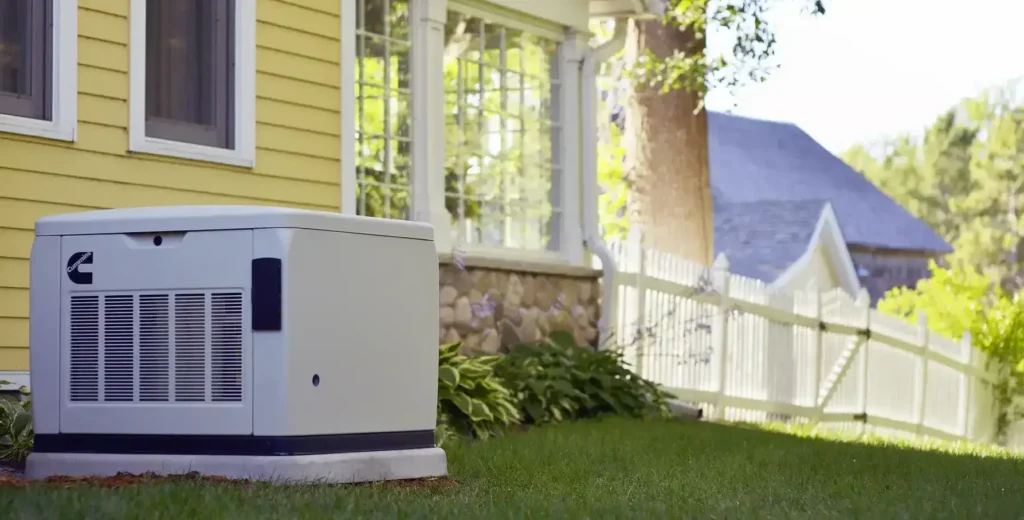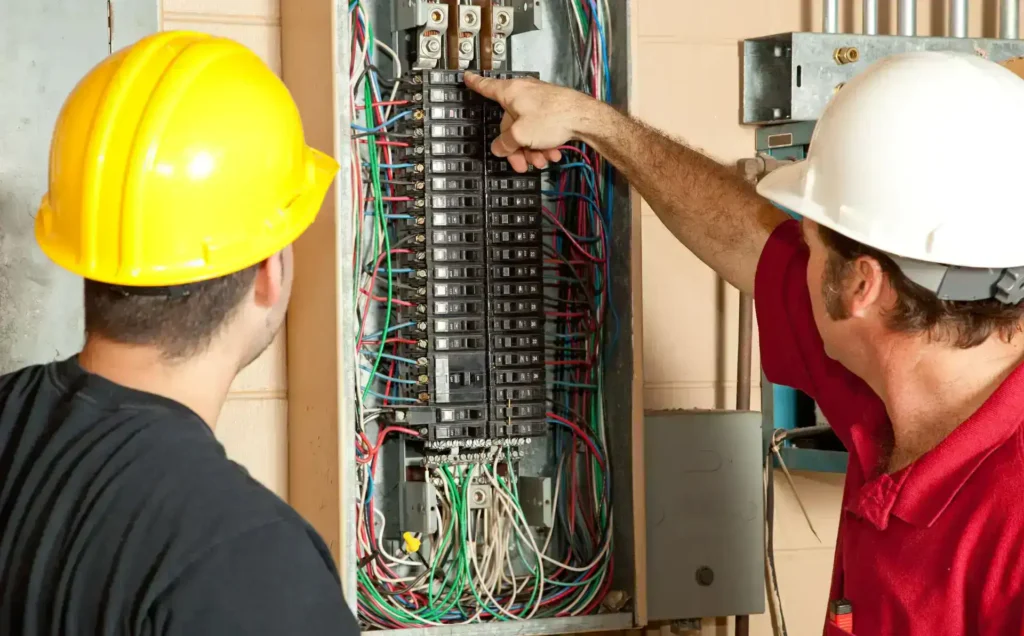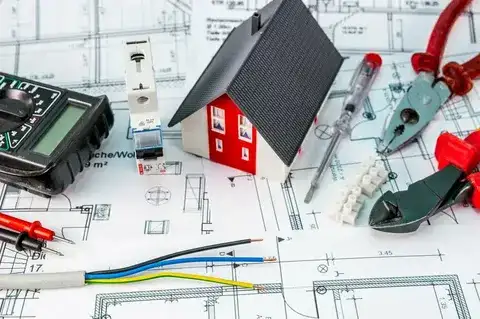A generator is the best option for running a house during power outages. A full-home generator costs between $1,524 and $8,658, while the average consumer pays around $5,090. The price depends on the size, wattage, and installation.
Investing in a generator ensures uninterrupted comfort for homeowners who want a reliable backup power source. Various options exist, but one must consider the home’s energy requirements. Some generators are more economical, and some deliver more power for larger homes.
Consider the initial costs of purchasing a generator against long-term maintenance. A whole-house generator may have a higher upfront cost but provides savings in the long run. One must also include installation costs, which significantly increase the total price.
Whole house generator cost

The calculation of the costs of a whole-house generator generally ranges between $3,000 and $6,000, while the installation may vary between $3,000 and $5,000. Depending on the size of the system or distance from the house, the price could increase to $9,500-$24,000.
| Item | Average Cost | Long Distances |
| Whole House Generator | $3,000 – $6,000 | $4,500 – $12,000+ |
| Installation | $3,000 – $5,000 | $5,000 – $12,000+ |
| Total Cost Installed | $6,000 – $11,000 | $9,500 – $24,000 |
Home generator costs by size
Costing includes generator sizes and power capacities. Large generators with higher wattage are usually more expensive because they can power more appliances and larger homes.
| Size | Unit price range | Typical coverage |
| 2 – 5 | $250 – $1,400 | Portable: One appliance and a few lights. |
| 7 – 10 | $2,000 – $3,000 | Portable: 10 lights, refrigerator, sump pump, well pump, microwave, TV, laptop, coffee maker, and furnace fan. |
| 13 – 16 | $3,000 – $4,500 | Full home under 1,500 square feet. |
| 17 – 20 | $4,000 – $6,000 | Full 1,500 to 3,000 square foot home. |
| 22 – 25 | $4,500 – $12,000 | Full 3,000 to 5,000 square foot home. |
| 30 – 48 | $10,000 –$16,000 | Large luxury homes or commercial applications. |
Whole house generator costs installed by type
Your type of generator and size of house will contribute to the cost: Some considerations in the cost of whole-house generators, including installation, are mentioned in a detailed description of various types.
| Fuel Type | Average Cost (Unit Only) |
| Diesel | $3,000 to $20,000 |
| Gasoline | $500 to $3,000 |
| Liquid Propane | $2,000 to $21,000 |
Other Home Generator Cost Factors
The article discusses the different types of generators available for whole-house backup power, supported by specifics regarding cost, power output, and purpose. It stresses the importance of choosing the right generator based on factors such as the size of the home, electrical panel, and power output.
Generator Type
The generator’s price varies depending on its category, which defines its general use. Accordingly, a portable generator typically costs between $500 and $2,000 and can power a handful of selected appliances, namely air conditioning, but never the entire house.
The much larger, more powerful partial generators are priced between $2,000 and $6,300. While they will power some of the most essential home systems, they are not intended to serve as complete home backup.
Whole-house generators are permanent installations hardwired to the house’s electrical system. They can power the whole home and are the most expensive, ranging from $5,000 to $18,000e. Those costs run higher for installation because they are large machines requiring heavy-duty labor.
Ultimately, selecting the right generator should address the household’s needs. Portable generators are cheaper, while whole-house generators provide the most dependable backup power.
Generator Size
When choosing a generator, selecting one with enough power to suit your needs is essential. Depending on size, standby generators cost between $500 and $18,000. Their kilowatt range is from 9 to 48 kW. A 20- to 24-kW standby generator, which costs between $5,000 and $6,500, is usually the best choice for running appliances in an average home.
Portable generators are cheaper but not particularly suited for running a whole house. They cost between $500 and $2,000 and have a capacity of about 1 to 7.5 kW. Thus, they can power just a handful of essential appliances, such as lights or refrigerators.
Consider the power required to keep your essential appliances working when choosing a generator size. Standby generators are more dependable for larger homes, whereas portable generators cater to more limited needs.
Generator Brand
When buying generators, homeowners usually have many brands to choose from online and in-store. Each brand offers different sizes and price ranges, so it’s essential to choose one that fits your needs and budget. The following is a short overview of some starting prices for some of the top generator brands in the market.
- Generac: Generac standby generators cost $2,000 for the smaller ones, and as you go up in size for whole-house generators, the pricing goes up to $5,000-$6,500.
- Honda: Honda has portable generators starting from $500 and is known for the efficiency and portability of these electric machines.
- Champion: They offer portable and standby generators. Portable generators cost around $400, while larger standby generators cost around $1,500.
- Kohler: Kohler’s whole-house generators start at around $2,500 and can be upgraded to higher-power units at $6,000.
This price breakdown would enable homeowners to locate a generator to suit their power needs while staying within budget.
Fuel Source
Different fuel sources are used in generators. Gasoline is the most used fuel for portable generators since it is easy to find and cheap to buy, though it requires frequent refueling. Propane is a cleaner-burning fuel and can be used wherever there is no natural gas. Natural gas is used in whole-house generators; it is cheap and eco-friendly since there is no need to refuel, provided a gas line into the house. Diesel is the last to be mentioned; it is more fuel-efficient for larger generators in homes or businesses due to the greater durability and extended run time.
Start Type
Every generator, be it portable or standby, is by manual start. Most portable generators start by pull cord method. However, some have electrical switch method. These manual starting generators usually come somewhere in the range of $500 to $2,000.
Standby generators wired into the electrical panel of the house automatically start when power is cut, thus minimizing power loss and protecting the home. Costlier ($2,000-$30,000) automatic generators include a manual start switch for backup.
Labor and Permits
Installation of generator systems is a cost that the contractor should detail. This may include charges for site preparation, manpower, fuel storage tanks, upgrading your electrical panel, additional materials, etc. Per installation, some contractors may charge a flat fee, and a homeowner may want to ask precisely what is included. Installation goes for about $1,500-$5,000 on average.
Since an installed generator connects to a home’s electrical system, a permit is required for safe installation. In addition, in many areas, one must pull a permit to pour a concrete pad for the generator’s support. The cost of these permits is generally between $50 and $200.
Location
The price of home generators can differ from place to place and depends on the distribution of fuel sources. An example is a natural gas generator, which finds favor in urban areas with good infrastructure as natural gas is readily available. In rural regions, diesel, propane, or gasoline generators are expected to be cheaper depending on the price and availability of these fuels.
While deciding on the generator type, it thus becomes imperative to consider the price of the generator and one-way fuel expenses correlating with the infrastructure and availability in your area; this will consequently lead to the rational choice of the most feasible option for your house.
Transfer Switch
Installation of transfer switch costs for home generators become $2,000 or so, ranging from around $1,435 to $2,565. Transfer switch installation is necessary when connecting the home generator with the primary utility line. Its role is to automatically switch from utility power to independent generator power during an outage so that power is supplied to the house by the generator uninterruptedly.
For more details on connecting a generator without a transfer switch, check out this helpful guide: How to Connect a Generator to Your House Without a Transfer Switch.
Do I Need a Home Generator?
A home generator can be a viable backup depending on location, medical necessities, and general living conditions during a power cut. If any of the below five reasons hold good for you, the investment is worth looking into.
- Power Restarts: Supposing your area is considerably interrupted by weather or other influences, a generator can keep you comfortable at times of power interruption.
- Essential Appliances or Medical Equipment: If you need something like refrigerators or freezers or medical devices such as CPAP machines, then a generator ensures they will work while power is down.
- Work From Home: In case you are someone who cannot afford to break the power-keeping chain working from home generating income, a generator would be an investment in non-interruption.
- Extreme Weather: If you live in an area that gets the brutal weather (about blizzards, hurricanes, or brutal heat), then this is one way to keep your home running when the grid fails.
- Off-Grid Living: If you want the whole independent living from the public power grid, then the home generator gives support to your home’s energy needs.
If one or the other of these reasons resonates with you, a home generator can give you a calming feeling and keep your home functioning well during periods of power outage.
Natural Gas Whole House Generator Vs Solar Battery
The natural gas whole-house generator is basically an excellent solution for a power source during the blackouts. It is easy to install whenever the home is in close proximity to a natural gas line and provides strong, steady power. However, it makes noise and requires maintenance, and you will have to spend money on fuel.
A solar battery system utilizes sunlight, free of cost, to charge and store extra power for later use. It is quiet, environment-friendly, and requires almost no maintenance. On the other hand, it has limited power storage capacity and high upfront cost. This indeed will be an answer for a long-term renewable energy provision.
Whole-House Generator Installation: DIY vs. Hiring a Professional
When contemplating whether to install a whole-house generator yourself or hire professionals, the early saving on DIY installation costs has its caveats-it presupposes knowledge of electrical systems, plumbing, and local regulations. Installation errors could place you in harm’s way, risking electric shock or carbon monoxide exposure. Permits and approvals are often required, which would only add complexity to your generator installation.
Hiring a professional, however, guarantees that your generator would be installed safely and correctly. Professionals will handle electrical connections, gas lines, and site work. They know the local codes and can acquire the necessary permits. It is pricier, normally between $2,375 and $6,500, but most homeowners will find the peace of mind and safety justify the added expense.
How to Save Money
Save money on purchasing a generator; it takes a lot of patience, timing, and making the right choices. Here are some tips to ensure a royalty-free purchase:
- Shop Around for Estimates: Get multiple estimates of the generator and the installation costs to compare prices, determine value, and find the best deal.
- Limit the Number of Contractors You Hire: Choose a contractor who can do everything involved, such as pouring concrete, gas plumbing, and electrical work that would otherwise require hiring subcontractors.
- Schedule Installation Off-Peak: Being an off-season buyer allows for lower prices overall for generators, as there are usually not many demands placed on them during the season due to the lack of power outages.
- It’s Good to Plan: Never buy a generator soon after a significant storm because the prices of materials, labor, and generators always rise.
- Do Some Pre-Work: Ask if you can do some site preparation or secure permits to lower contractor costs.
- Buy the Correct Size Generator: Ensure you’re buying the right generator. Otherwise, you may pay a lot for an oversized generator or one that cannot meet your house’s power needs.
Conforming to these tips would save you bucks while ensuring you get the right generator for your home.
Conclusion
A whole-house generator backup is a dependable source of power. Depending on the size and features, it can cost anywhere between $5,000 and $18,000. The necessary installation and electrical work are included.
The high upfront cost is outweighed by the assurance the whole-house generator provides to keep your home powered during outages. In terms of convenience and reliability, it is a worthwhile investment, especially in areas that experience regular power interruptions.
FAQS
Q1. Do I need a whole-house generator?
A whole-house generator is an excellent decision if you desire uninterrupted power for your home during a blackout.
Q2. How much to run a generator all day?
The run cost of the generator all day ranges from $20 to $50, depending on the fuel type and size of the generator used.
Q3. How many generators do I need to run a whole house?
The 20 to 24 kW generator can be used with most home appliances, including a whole-house HVAC system.
Q4. How long is it safe to run a whole house generator?
A whole-house generator can run continuously for many hours to days if kept in good condition.


